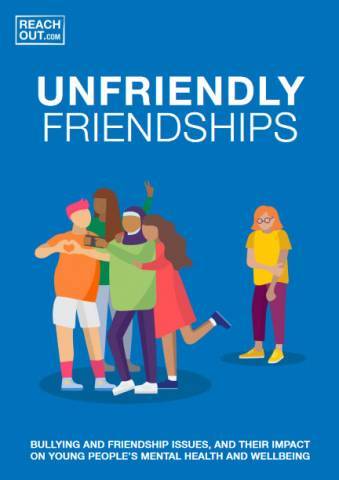New approaches to bullying

Report finds new approaches to bullying needed for young Australians
A new report from ReachOut, titled Unfriendly Friendships, has found that textbook definitions of bullying are missing the mark with young people, and says that a new approach is required to reduce rates of bullying and its impact on the mental health of young people in Australia.
The report concluded that young people found it difficult to label their experiences as bullying, particularly if the bullying comes from a friend, even when the experience is causing significant emotional distress.
Traditional definition and perceptions of 'a bully' as a stranger or someone outside of peer groups, means that young people may not act or seek support when these issues are present within friendship groups.
The report outlines the findings of two online surveys, each with representative samples of 1000 young people aged 14 to 25 years from across Australia. The first asked young people if they were bullied according to a standard definition of bullying, with one in four young people self-reporting they were bullied in the past year (24.2 per cent).
The second survey asked young people if they had experienced a series of behaviours typically associated with bullying and peer issues, with almost half (46.3 per cent) experiencing at least one of the bullying behaviours in the past month – considerably higher than the self-reported rate of bullying.
The most common peer and bullying behaviours experienced included being ignored (41.4 per cent), having someone talk about them behind their back (31.6 per cent) and having gossip or rumours spread about them (23.2 per cent).
Different behaviours impacted young people to varying degrees. The most impactful behaviour experienced was being sent abusive or hurtful messages (typical of cyberbullying) with 73.8 per cent of young people reporting a moderate to major impact on mental health and wellbeing, followed by being excluded online (73.7 per cent). This was higher than the impact of physical bullying (71.1 per cent).
Ashley de Silva, CEO of ReachOut, said that a contemporary approach is required to ensure that young people get the right support as bullying continues to have a significant impact on the mental health of thousands of young people in Australia each year.
"This new report is significant because it drills down into the experiences of bullying that young people in Australia are living through each day, be that in the classroom, outside of school and online.
"Especially relevant is that when it comes to toxic and harmful behaviours within friendship groups, young people aren't defining their experiences as bullying and the strategies we offer to deal with bullying aren't going far enough, and could actually make things worse.
"A lot of good work is being done when it comes to bullying, however we need to bolster strategies that support young people to build the skills and confidence to navigate friendship issues; as well as equip parents and carers, and educators, to provide support, help young people deal with hurtful behaviours by friends and peers, and cope.
"Strong friendships are an important part of young people's lives, so it's really important that we are able to support them to build healthy friendships.
"This is especially relevant right now as COVID-19 exacerbates online bullying, with the eSafety Office reporting record numbers of complaints."
Every year ReachOut helps thousands of young people with bullying and friendship issues. This year alone over 109,000 people have accessed ReachOut's youth service to deal with friendship and bullying issues. For more information about ReachOut, visit ReachOut.com and ReachOut.com/Parents.
MORE





